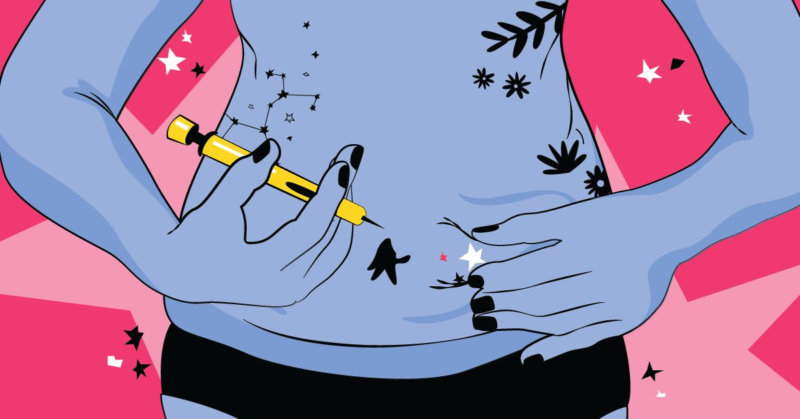Things to Expect If You Take Biologics for Crohn’s

Biologics are targeted treatments that may help you manage symptoms and achieve remission if you have moderate to severe Crohn’s disease.
If there’s an upside to having Crohn’s disease, it may be that there are many treatment options available. So if you’ve been managing symptoms with steroids or other anti-inflammatories and you’re still having flare-ups, or if you have moderate to severe Crohn’s disease, you do have options.
One is to try a biologic — a type of medication that targets specific proteins in your immune system to stop the inflammation that’s wreaking havoc on your gastrointestinal (GI) tract. Finding the right one could help put your Crohn’s into remission and put an end to those annoying symptoms.
If you were awake for any part of high school biology class, you might remember that proteins have many jobs in your body. If you have Crohn’s disease, certain proteins in your immune system attack and inflame your GI tract. This leads to symptoms such as persistent diarrhea, the urgent need to poop, and stomach cramps and pain.
Biologics block those harmful immune system proteins. They’re targeted, which means they work only on the proteins that cause the inflammation underlying Crohn’s disease — they don’t mess with other parts of your body.
There are a few groups of biologics, and each one targets a different protein. The goal is to get your Crohn’s into remission and keep it there.
Anti-tumor necrosis factor (anti-TNF) drugs block TNF-alpha, a protein that causes inflammation in your intestines and other parts of your body. In addition to helping stop Crohn’s disease symptoms, they can promote healing in your intestines and may help you avoid surgery. This category includes the following medications:
- adalimumab (Humira)
- certolizumab pegol (Cimzia)
- golimumab (Simponi)
- infliximab (Remicade)
Integrin receptor antagonists are another type of biologic that block inflammation-promoting cells from getting into your intestines. This category includes:
- natalizumab (Tysabri)
- vedolizumab (Entyvio)
Biologics called interleukin-12 and -23 antagonists block IL-12 and IL-23, two proteins that play key roles in the inflammatory process in Crohn’s. This category includes:
- risankizumab (Skyrizi)
- ustekinumab (Stelara)
Taking one of these meds early could help you avoid serious complications such as narrowing in your intestines (strictures) or a tunnel in your intestinal wall (fistula). That means you may also be able to skip the surgery you’d need to fix those problems.
Biologics come as an injection (shot) or as an infusion into a vein. Not great news if you’re needle-phobic, but there’s no madness to this method. If you tried to take a biologic as a pill, your stomach would break down the medication and render it useless before it reached your intestine.
Your doctor can teach you how to give yourself injections of biologics such as adalimumab, certolizumab pegol, golimumab, and infliximab. Once you get the hang of it, you can give yourself the shots at home once every 2–4 weeks.
For meds such as natalizumab and vedolizumab, you have to go to a hospital or infusion center once every 4–8 weeks. It takes 30 minutes to an hour to get the whole dose.
Ustekinumab comes as an infusion for the first dose, and then you give yourself injections for all future doses. Risankizumab is given through infusion for the first three doses and then as a self-injection once every 8 weeks after that.
No medication is risk-free, and biologics are no different. Your doctor should let you know about the side effects ahead of time and help you deal with any that you experience.
Because a needle is involved, one possible side effect is a reaction at the injection or infusion site. If that happens, you might notice symptoms like these on your skin:
- bruising
- itching
- pain
- rash
- redness or other discoloration
- swelling
Biologics target specific parts of your immune system rather than your whole immune system, but they can still leave you less protected against germs. That means you’ll have an increased risk of infections, including mild infections like colds and more serious ones such as tuberculosis.
Before you start a biologic, your doctor will likely run tests to make sure it’s safe for you.
Other possible side effects, including liver damage and a cancer called lymphoma, are rare. Still, it’s worth asking your doctor which side effects your medications might cause and then stay alert for them.
The goal of biologics is to put you into remission. That means relief from Crohn’s symptoms such as diarrhea, weight loss, and tiredness. So, once you’ve made it across the remission finish line, why keep taking biologics?
You might have good reasons for wanting to stop taking your medication. Going off the drug means saying bye-bye to needle sticks, side effects (if you’ve had them), and the potentially high price of biologics.
But if you stop your biologic, your symptoms could pop up again. Research has shown that people with inflammatory bowel disease who stop taking a biologic have more relapses than those who stay on their meds.
You should never stop taking your medication without first talking with your doctor. They can help you weigh the pros and cons of stopping vs. staying on biologics. They may also be able to help you find ways to make injections easier, manage side effects, or get financial assistance to help pay for your medication.
Biologics can weaken your immune system, which means you could have a higher risk of infections.
You’ll be better protected if you’re up to date on all your vaccines. Here are the ones that should be on your to-do list before you start on a biologic (if you haven’t already gotten them):
- chicken pox (if you’re not taking any immune-suppressing meds — it’s a live vaccine)
- COVID-19
- diphtheria, tetanus, and pertussis (DTaP)
- flu
- hepatitis B
- haemophilus influenzae type B (Hib)
- human papillomavirus (HPV)
- measles, mumps, and rubella (MMR) (if you’re not on immune-suppressing meds)
- meningitis
- pneumonia
- shingles
Your doctor can tell you which shots you need and when to get them. Some, like the hep B vaccine, should be done before you start on a biologic.
Before you start on a biologic, a convo with your doctor is in order. Ask how the drug might affect you. Find out about the possible side effects and what to do if you experience them.
You’ll need to fill your doctor in too. Let them know about any other medications or supplements you take, including ones you buy over the counter at a drugstore or supermarket. Also tell them if you’re pregnant or planning to get pregnant in the near future.
Crohn’s symptoms can really mess with your life. If your current treatment isn’t taming them, biologics might be the next logical step.
You might have to try a few different biologics to find the one that works for you. And once you find something that puts your Crohn’s into remission, you may need to stay on it for a long time (we’re talking years) to avoid flare-ups. But the trade-off is that you’ll spend a lot less time managing Crohn’s symptoms and have more time to just be you.








